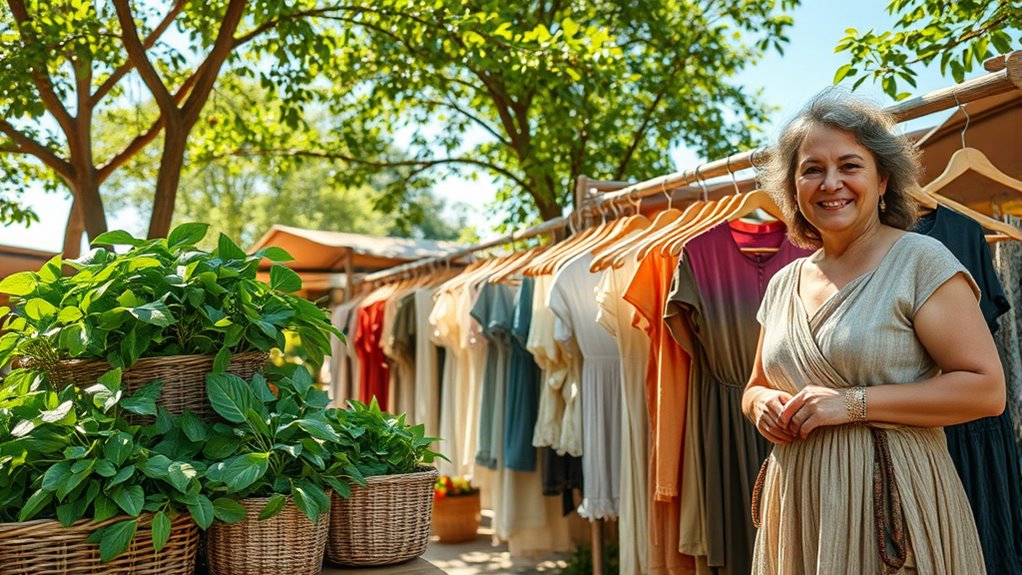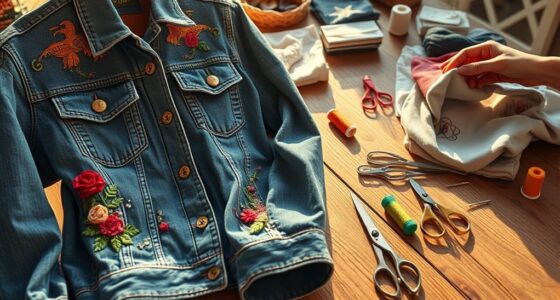Many common myths about sustainable fashion can mislead you into thinking it’s always eco-friendly or affordable. Not all labels guarantee environmentally responsible or ethical production, so you should investigate further. Sustainable fashion isn’t just for the wealthy—there are stylish, affordable options available. Remember, sustainability isn’t just a trend, but an ongoing effort rooted in genuine practices. If you want to uncover the truths behind these misconceptions and make smarter choices, keep exploring the facts.
Key Takeaways
- Not all fabrics labeled “eco-friendly” genuinely reduce environmental impact; consider full lifecycle impacts before trusting labels.
- Ethical manufacturing isn’t universal; verify brands’ supply chains and certifications to ensure fair labor practices.
- Sustainable fashion can be stylish and affordable; many brands offer fashionable, eco-conscious options across price ranges.
- Sustainability is a long-term movement, not just a passing trend—commitments should be transparent and consistent.
- Informed consumer choices involve understanding brand practices and supporting truly responsible, transparent brands.

Is sustainable fashion truly as eco-friendly and ethical as it’s made out to be? It’s a question many people ask as they try to make more responsible choices. The truth is, while sustainable fashion aims to reduce environmental impact and promote fairness, there are still many myths clouding its reputation. One common misconception is that all eco-friendly materials are automatically sustainable. In reality, not every fabric labeled as “eco-friendly” truly minimizes harm. Some materials, like organic cotton, are better than conventional options, but they still require significant water, land, and energy to produce. Others, like recycled polyester, reuse plastic waste and reduce landfill overflow, but still involve energy-intensive manufacturing processes. It’s essential to look beyond labels and understand the entire lifecycle of the materials used.
Another myth is that sustainable fashion brands always practice ethical manufacturing. While many do, it’s not a universal standard. Ethical manufacturing involves fair wages, safe working conditions, and respect for workers’ rights, but some brands claim sustainability without fully adhering to these principles. Fast fashion companies might market limited eco-friendly lines, yet their core practices may still exploit workers or cut corners on safety. As a conscious consumer, you should scrutinize a brand’s supply chain and certifications rather than relying solely on marketing claims. Transparency is key to truly understanding whether a brand prioritizes ethical manufacturing.
Not all sustainable brands practice ethical manufacturing; always scrutinize supply chains and certifications for true responsibility.
Furthermore, some believe that choosing sustainable fashion automatically means sacrificing style or affordability. This isn’t true. Many brands now offer fashionable, well-made pieces at reasonable prices, proving that eco-conscious choices can be accessible. You can find stylish options made with eco-friendly materials that don’t break the bank. The myth that sustainable fashion is only for the wealthy discourages many from making responsible decisions, but the industry is evolving to include more inclusive options.
Lastly, there’s a misconception that sustainable fashion is a passing trend. In reality, it’s a growing movement driven by genuine environmental and social concerns. It’s about shifting the industry towards more responsible practices over the long term, not just jumping on a fad. While some brands might jump on the bandwagon for marketing purposes, the core principles of sustainability—reducing environmental harm and promoting fair labor—are here to stay. Additionally, the increasing availability of Vetted – Halloween Product Reviews demonstrates how transparency and quality standards are becoming more integral to sustainable practices.
In the end, understanding these myths helps you make more informed choices. Sustainable fashion isn’t perfect yet, but by digging deeper into what brands stand for—like their use of eco-friendly materials and commitment to ethical manufacturing—you can support truly responsible practices and contribute to meaningful change.
Frequently Asked Questions
Are Sustainable Fashion Brands More Expensive Than Traditional Brands?
You might think sustainable fashion brands are more expensive than traditional brands, but the cost comparison isn’t always clear-cut. Brand pricing varies widely, and some sustainable brands offer affordable options, while others focus on high-end, eco-friendly materials. It’s worth researching, as the initial price may reflect better quality and durability. Ultimately, investing in sustainable fashion can save you money in the long run by reducing frequent replacements.
Can Sustainable Fashion Be Produced at Scale Without Environmental Harm?
Did you know that sustainable fashion accounts for just 1% of global clothing production? Scaling techniques are evolving to help produce sustainable fashion at larger volumes, but challenges remain. You can help reduce environmental impact by supporting brands that prioritize eco-friendly practices and innovations. While scaling without environmental harm is complex, responsible efforts and technological advances are making it more achievable, so your choices truly matter in shaping a greener industry.
Does Sustainable Fashion Compromise on Style and Variety?
You might wonder if sustainable fashion limits style and variety, but it actually promotes fashion diversity and style innovation. By embracing eco-friendly materials and ethical practices, designers create unique, trendsetting pieces that stand out. Sustainable brands often experiment with new designs, offering fresh options for every taste. So, instead of compromising, sustainable fashion enhances your wardrobe with diverse styles that are both innovative and environmentally responsible.
Are All Eco-Friendly Fabrics Truly Sustainable?
Not all eco-friendly fabrics are automatically sustainable. While biodegradable textiles break down naturally and reduce waste, some materials may require energy-intensive processes or non-renewable resources. Conversely, fabrics made from renewable resources like organic cotton or bamboo tend to be more sustainable. Always check the production methods and lifecycle impacts of these fabrics to guarantee you’re choosing truly eco-conscious options rather than just greenwashed labels.
How Can Consumers Identify Genuinely Sustainable Fashion Brands?
Imagine trying to spot a genuine diamond in a pile of glass. To identify truly sustainable fashion brands, look for certification labels like GOTS or Fair Trade, which act as your filters. Also, check their transparency practices—do they openly share supply chain details? Brands that are honest about their processes and hold certifications are more likely to prioritize sustainability, helping you make eco-conscious choices confidently.
Conclusion
Sustainable fashion isn’t just a trend; it’s a seed you plant in the garden of our planet’s future. Every choice you make, like watering that seed, helps it grow into a thriving tree of change. Don’t let myths be weeds choking your efforts. Your mindful decisions are the sunlight that nurtures progress. Together, we can turn the fabric of fashion into a tapestry of hope and renewal, one conscious step at a time.









